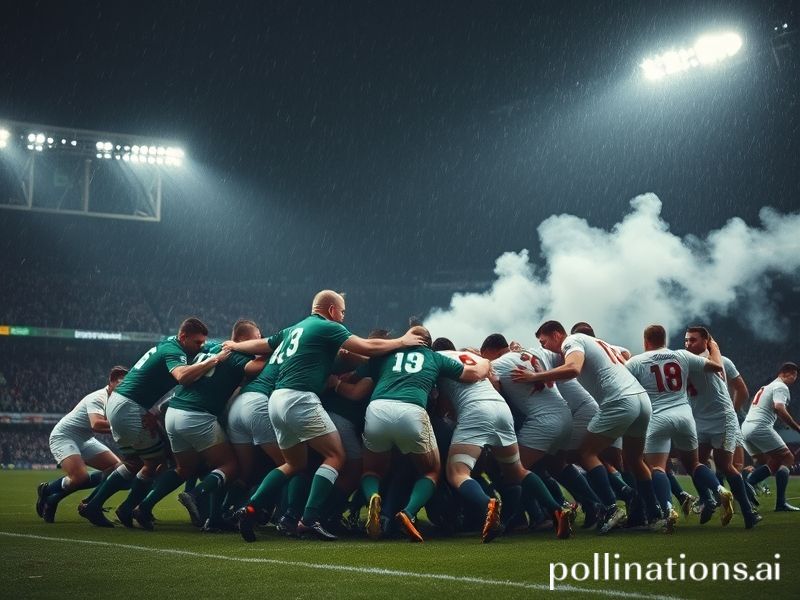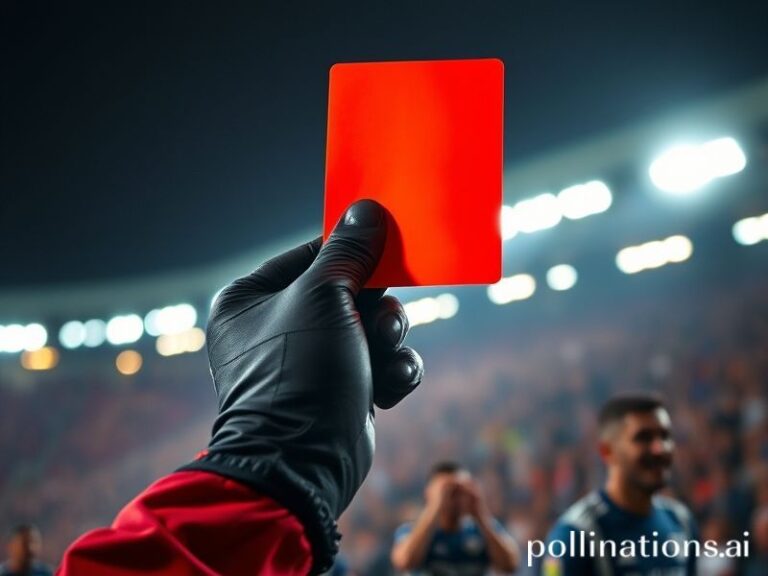Shamrocks vs Stiff Upper Lips: How a Rugby Score Became the World’s Favorite Proxy War
Dublin, Thursday — While the rest of the planet frets about AI apocalypses, interest-rate tantrums, and whatever new crypto-cult Elon is midwifing this week, two rainy islands off Europe’s shoulder have decided the pressing geopolitical issue is a rugby score. Ireland 29, England 16. Cue fireworks on the Liffey, pints aerating like shaken sodas, and a collective English sulk so thunderous it registered on seismographs in Reykjavik.
From an international vantage point—say, a bar in Lagos where the satellite feed keeps cutting to frozen chicken adverts—the spectacle looks less like sport and more like a centuries-old custody battle played out in 80-minute installments. Dublin’s victory at the Aviva wasn’t merely another notch in the Six Nations table; it was a brisk reminder that certain grudges age like peated whiskey, smoky and impossible to ignore.
Global markets, ever sentimental, responded with the emotional depth of a spreadsheet. Sterling wobbled a cent, Irish government-bond yields tightened two basis points (because nothing says “national virility” like slightly cheaper debt), and a Tokyo analyst issued a note headlined “Post-Colonial Momentum Plays” suggesting long positions in Kerrygold futures. Somewhere in Silicon Valley, a start-up founded by two lads from Cork and Canterbury—former flatmates who once came to blows over the correct pronunciation of “scone”—just pivoted its app to predict nationalist sentiment via scrum metrics. Seed round closes next week.
But let’s zoom out. The fixture arrives as Britain continues its solo interpretive dance titled “Global Britain,” an interpretive piece that resembles someone trying to tango with an ironing board. Meanwhile, the EU—minus Britain, plus a perpetually exasperated Ireland—has discovered that being the adult in the room pays. Last month alone, the bloc inked trade deals on critical minerals with Namibia and green hydrogen MOUs with Morocco, all while Westminster debated whether the metric system was woke.
Washington, ever eager to referee family feuds it barely understands, dispatched a mid-level diplomat to the match with talking points about the Good Friday Agreement and semiconductor supply chains. He left the stadium drenched, both by horizontal sleet and by a Dubliner explaining that the phrase “special relationship” sounds suspiciously like what a spouse says before asking for a divorce.
For the Global South, the Ireland-England pas de deux is a masterclass in how former colonies weaponize nostalgia. India’s cricket writers filed 1,200-word think-pieces comparing the fixture to their own 1983 World Cup moment, Nigeria’s Twitter wags Photoshopped shamrocks onto Super Eagles jerseys, and an Argentine commentator noted that if the Falklands ever fielded a rugby team, they’d probably lose by exactly 13 points too.
Back in Europe, the match feeds into bigger anxieties. Paris is watching nervously; if Ireland completes a Grand Slam on French soil next week, the Élysée fears it will be accused of abetting Anglophobia by mere proximity. Berlin, pragmatic as ever, has calculated that every Irish try boosts EU GDP by 0.0003% via stout exports and existential schadenfreude. Brussels bureaucrats, tipsy on Delirium Tremens, have drafted a white paper declaring rugby an intangible cultural heritage—right next to Belgian fries and the ability to form coalition governments.
And yet, beneath the tribal choreography, something oddly humane flickers. At full-time, England’s captain thanked the Irish crowd for their “brilliant hostility,” which in modern parlance passes for a love letter. Irish fans applauded him back, because nothing disarms enmity faster than shared hypothermia. In the mixed zone, a Welsh journalist asked an Irish prop if this meant Ireland was now “the real small island punching above its weight.” The prop grinned: “Mate, we’ve been punching for eight centuries. We just finally landed one in extra time.”
Conclusion: The world will keep spinning, COP summits will keep failing, and some hedge-fund algorithm will soon short the pound because of a disallowed try. But for one sodden evening, two nations distilled their messy, blood-stained, Guinness-lubricated history into a game where the only invasion was tactical kicks and the only casualties were English egos. Which, if you think about it, is progress—of a very Irish sort: incremental, poetic, and served with a side of sarcasm.







